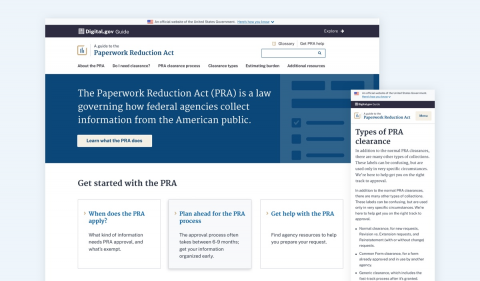Information collection
The process of gathering and documenting data from various sources to fulfill a specific purpose
Information collection is the first step of many when conducting research and it can involve various methods and technologies. It’s also the process by which federal agencies gather or ask for information about the people who use their services. Collections may require the use of complex forms or sensitive questions, including personally identifiable information. Make sure you follow best practices when collecting information to protect the identity of your users, and to respect their time.
Paperwork Reduction Act (44 U.S.C. Chapter 35, PDF, 451 KB, 47 Pages)

Resources on Information collection
-
Requirements for transforming federal customer experience and service delivery
Learn how to strengthen customer experience and service delivery within your federal agency.
-
An introduction to customer experience
Understand what customer experience (CX) is and how to leverage customer feedback and analytics to enhance the public’s experience when interacting with government services.
-
Overview of the Privacy Act of 1974 (2020 Edition)
This overview, prepared by the Department of Justice’s Office of Privacy and Civil Liberties (OPCL), covers various provisions of the Privacy Act, as addressed by court decisions in cases involving the Act’s disclosure prohibition, its access and amendment provisions, and its agency record-keeping requirements.
-
OMB memo: Testing and simplifying federal forms
This memo sets forth that "To the extent feasible and appropriate, especially for complex or lengthy forms, agencies shall engage in advance testing of information collections, including Federal forms, in order (1) to ensure that they are not unnecessarily complex, burdensome, or confusing, (2) to obtain the best available information about the likely burdens on members of the public (including small businesses), and (3) to identify ways to reduce burdens and to increase simplification and ease of comprehension. Such advance testing should occur either before proposing information collections to the public or during the public comment period required by the PRA."
Information collection events
Information collection news
User research and the Paperwork Reduction Act
User research is an important part of customer experience transformation. Different types of research require different approval under the Paperwork Reduction Act (PRA). Through seven case studies, the U.S. Digital Service shows how agencies conducted valuable user research that did not require PRA approval and successfully integrated findings into their projects. Their work illustrates how thoughtful user research transforms delivery of services and helps agencies build trust in government. — via U.S. Digital Service

Designing for people with disabilities
The User Experience (UX) team at USA.gov’s Public Experience Portfolio recently conducted a study to analyze the experiences of individuals who access USA.gov through assistive technology. The team partnered with a local organization to gather insights from a diverse group of participants, many of whom are blind or deaf. The study revealed various habits and challenges faced by these users, such as a preference for mobile sites, difficulty with website carousels, and a reliance on clear headings and action-oriented descriptions. These findings can guide improvements in accessibility, such as clever link labeling and better navigation aids for assistive technology users. — via USA.gov

Back to basics in the age of AI
The federal government is actively discussing the transformative potential of artificial intelligence (AI). It has the potential to transform our digital service delivery, automate tasks, and enhance data analysis. However, AI also presents challenges and risks such as bias and ethical concerns. The team at 18F provides a quick overview of AI, its place in government today, and the techniques and frameworks they are currently using to navigate this complex new landscape. — via 18F

One year with the new USAGov
It has been a year since USA.gov and USAGov en Español were relaunched using human-centered design principles. Using task backlog, the USAGov team has addressed content gaps, improved discoverability, and implemented technical updates. Through usability tests, visitor comments, and click behavior the team was able to unravel and respond to user feedback and unmet needs, leading to noticeable increases in visitor satisfaction and task accomplishment. Moving forward, the focus will shift to enhancing public engagement with the government, improving the search for benefits-related content, and exploring interactive and personalized user experiences. — via USA.gov

FEMA National Summit on Risk Communications, Crisis Communications, and Community Engagement
The Federal Emergency Management Agency Office of External Affairs is convening risk and crisis communicators and community leaders who are on the front-line of the climate and emerging hazard crises. Attend the free, June 10, 2024, summit virtually, or in Washington, DC. The agenda includes: the sharing invaluable tools and insights, how to implement culturally competent and accessible communications, how to integrate behavior change strategies, and more. An ASL interpreter will be provided. — via Federal Emergency Management Agency

Resources on Information collection
-
Requirements for transforming federal customer experience and service delivery
Learn how to strengthen customer experience and service delivery within your federal agency.
-
An introduction to customer experience
Understand what customer experience (CX) is and how to leverage customer feedback and analytics to enhance the public’s experience when interacting with government services.
-
Overview of the Privacy Act of 1974 (2020 Edition)
This overview, prepared by the Department of Justice’s Office of Privacy and Civil Liberties (OPCL), covers various provisions of the Privacy Act, as addressed by court decisions in cases involving the Act’s disclosure prohibition, its access and amendment provisions, and its agency record-keeping requirements.
-
OMB memo: Testing and simplifying federal forms
This memo sets forth that "To the extent feasible and appropriate, especially for complex or lengthy forms, agencies shall engage in advance testing of information collections, including Federal forms, in order (1) to ensure that they are not unnecessarily complex, burdensome, or confusing, (2) to obtain the best available information about the likely burdens on members of the public (including small businesses), and (3) to identify ways to reduce burdens and to increase simplification and ease of comprehension. Such advance testing should occur either before proposing information collections to the public or during the public comment period required by the PRA."
More News and Events on Information collection
12 posts
User research and the Paperwork Reduction Act
User research is an important part of customer experience transformation. Different types of research require different approval under the Paperwork Reduction Act (PRA). Through seven case studies, the U.S. Digital Service shows how agencies conducted valuable user research that did not require PRA approval and successfully integrated findings into their projects. Their work illustrates how thoughtful user research transforms delivery of services and helps agencies build trust in government. — via U.S. Digital Service

Designing for people with disabilities
The User Experience (UX) team at USA.gov’s Public Experience Portfolio recently conducted a study to analyze the experiences of individuals who access USA.gov through assistive technology. The team partnered with a local organization to gather insights from a diverse group of participants, many of whom are blind or deaf. The study revealed various habits and challenges faced by these users, such as a preference for mobile sites, difficulty with website carousels, and a reliance on clear headings and action-oriented descriptions. These findings can guide improvements in accessibility, such as clever link labeling and better navigation aids for assistive technology users. — via USA.gov

Back to basics in the age of AI
The federal government is actively discussing the transformative potential of artificial intelligence (AI). It has the potential to transform our digital service delivery, automate tasks, and enhance data analysis. However, AI also presents challenges and risks such as bias and ethical concerns. The team at 18F provides a quick overview of AI, its place in government today, and the techniques and frameworks they are currently using to navigate this complex new landscape. — via 18F

One year with the new USAGov
It has been a year since USA.gov and USAGov en Español were relaunched using human-centered design principles. Using task backlog, the USAGov team has addressed content gaps, improved discoverability, and implemented technical updates. Through usability tests, visitor comments, and click behavior the team was able to unravel and respond to user feedback and unmet needs, leading to noticeable increases in visitor satisfaction and task accomplishment. Moving forward, the focus will shift to enhancing public engagement with the government, improving the search for benefits-related content, and exploring interactive and personalized user experiences. — via USA.gov

FEMA National Summit on Risk Communications, Crisis Communications, and Community Engagement
The Federal Emergency Management Agency Office of External Affairs is convening risk and crisis communicators and community leaders who are on the front-line of the climate and emerging hazard crises. Attend the free, June 10, 2024, summit virtually, or in Washington, DC. The agenda includes: the sharing invaluable tools and insights, how to implement culturally competent and accessible communications, how to integrate behavior change strategies, and more. An ASL interpreter will be provided. — via Federal Emergency Management Agency

Creating a blueprint for quality: How the PX Contact Center helps agents grow their skills
Every day, live agents at USA.gov’s Public Experience (PX) Contact Center answer questions from the public about government benefits and services. Learn how the PX Contact Center develops a workforce of excellent agents, using immersive onboarding, tailored and continuous training, feedback loops, and calibration meetings to empower their agents to deliver accurate information. USA.gov’s system for employee and contact center management ensures that every customer interaction leaves a lasting impact. — via USA.gov

Google Analytics 4: Transition strategies for federal websites
Learn how the Open Data, Design, and Development (ODDD) team at the Department of the Interior (DOI) transitioned from Google Analytics - Universal Analytics to Google Analytics 4! Discover how the ODDD team coordinated with the Digital Analytics Program, developed explorations (instead of custom reports), and set up their own DOI agency property. — via Office of Natural Resources Revenue

Calling All Americans! The federal government is seeking your input
The White House Office of Management and Budget (OMB) wants your thoughts on how federal agencies can more broadly and meaningfully engage with you and your communities. Share your ideas by May 17, 2024 to help build a more inclusive, responsive, transparent, and accountable government. — via Performance.gov

Continuously improve your website by using customer feedback and web analytics: An IRS case study
Feedback-Driven Updates to the PRA Guide
This week, the Office of Information and Regulatory Affairs (OIRA), clarified the process for information collections associated with the Paperwork Reduction Act (PRA). These changes include an easy to understand chart that lays out the steps for this sometimes hard to understand process, and are a direct result of the feedback they’ve been getting from the community. — via The Guide to the Paperwork Reduction Act

Introducing a Guide to the Paperwork Reduction Act
A guide to navigating the PRA process with confidence.







